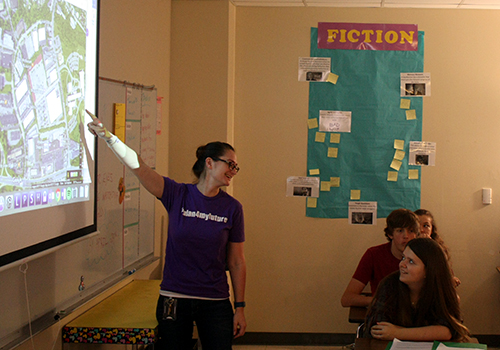Research course preps for college

English teacher Cory Deboest instructs her English II class. Deboest will teach AP Seminar next school year.
April 28, 2017
Ta expand students’ horizons and introduce them to higher level researching, A new program named Advanced Placement Capstone will be offered in the 2017-2018 school year.
AP Capstone includes AP Seminar for the first year of the program and AP Research the second year of the program. The course is designed to prepare high school students to do college level research.
In AP Seminar, the class is split up into thematic units where students investigate topics relevant to today and build skills in independent research, collaborative teamwork and communication skills. Teacher Cory Deboest then will guide students in formulating questions from thematic units based on a wide variety of real life everyday issues.
“There are topics that deal with legal issues with social justice, economics, history, and politics,” Deboest said. “We take those thematic units and approach them from different viewpoints… to see how it has affected different people in different times.”
By synthesizing and integrating connections, students then figure out what they want to learn and how to figure it out. But they aren’t completely on their own.
“I help you with the research and guide you on how to do it so it’s exactly what you’re going to be doing in college.” Deboest said.
Skills that students typically must teach themselves in college come in the AP Seminar curriculum. Multiple benefits include skills such as the ability to present in a professional fashion and creating flexible viewpoints.
Deboest described the biggest benefit as learning how to do college level research and formulate individual research questions.
“You learn is how to do database research, how to verify sources, how to cross check, how to make sure that your sources are reliable, [and] how to format for different types of papers,” Deboest said. “[You also learn] how to look back on your research and say, ‘That didn’t work. What am I going to try differently next time?’ and then to construct sound arguments and analyze rhetorical structure.”
Deboest described her favorite thing as its interdisciplinary focuses. Students can compare and evaluate continuities in time.
“One of my history teachers in college used to really like to say that there are no monocausal events in history.” Deboest said. “There’s not just one reason something happened so we get to look at a bunch of different reasons and whatever you’re interested in is probably going to come up.”

